How it Works
If you know how to be a friend, then you already know how to be a great “Big”.
Here are some of the most frequently asked questions and answers for you.
What kind of programs are available?
What are the volunteer requirements?
How do I apply?
What kind of commitment is expected of me?
What kind of support will BBBS give me?
What do Bigs and Littles do together?
Do I get to choose what child I mentor?
Can my spouse and I mentor together?
What happens if my Little and I don't seem to hit it off?
Can my own child go with us on outings?
I’m not sure now is the right time for me to mentor. What else can I do?
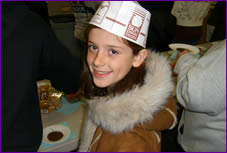
What kind of programs are available?
We have three basic types of programs:
- Community based, our traditional and most flexible one-to-one mentoring
- Site based, where adults meet an hour a week with a Little at a school or community site
- School based/High School Bigs, where high school students mentor elementary school youth
To learn more about our programs, click here
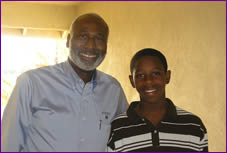
What are the volunteer requirements?
For the Community and Site based programs, a volunteer must be at least age 18 and
- Have a valid driver’s license.
- Provide three references
- Participate in an in-person interview and a home visit for the community-based program
- Have a background check performed, which includes fingerprinting for $15 and a DMV print-out
For the School based program, a teen must be
- at least a second semester freshman
- participate in an in-person interview
- have a background check that includes finger-printing
- be referred or have a school reference
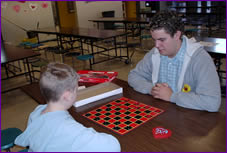
How do I apply?
The easiest and fastest way is complete a short on-line application. After we receive it, a staff member will contact you.
Or call us directly at the county office location nearest you or toll-free to 1-877-343-7812.
What kind of commitment is expected of me?
Depending upon the type of program you pick, you may be expected to commit as little as an hour a week or several hours at least a couple times a month. Our community based matches usually spend about 3-4 hours a week, but the timing is dependent upon individual schedules. The important thing is consistency.
Research shows that the benefits of mentoring really begin to show after a year together. We ask each volunteer to commit a year in whatever program they choose. We also know from research that matches that end much earlier than expected – less than 6 months – can actually have a negative effect on the youth. Be honest with yourself if you anticipate a coming job or life change within the next 12 months. Will you be able to maintain your friendship with your Little? If you’re not sure, think about waiting for the right time and help us out in other ways instead.
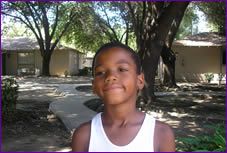
What kind of support will BBBS give me?
Our organization is oriented toward giving you and your match support whenever you need it.
Before you have your first meeting with your Little, you will receive training and orientation for about an hour. If you are mentoring a child of an incarcerated parent, a longer group training will be provided to orient you to the unique needs of children in this situation.
Each month in your first year, a Match Support Specialist will contact you, the Little, and the caregiver to see how things are going. The staff member is available at any time for questions or support in difficult or unanticipated circumstances. We send out e-blasts with free or low-cost activities and tickets made available to us for outings. Group activities are also provided, usually on a quarterly basis, to connect with other Bigs and Littles.
What do Bigs and Littles do together?
They have fun, doing things big and small. They play sports, hang out, take bike rides, go to the movies, learn to cook or bake, run errands together, learn how to budget for an outing, hike in the mountains, talk about Life and what to do in the future, laugh, joke together, and do what interests them both.
Although one of the benefits of mentoring is improvement academically, this is not a tutoring program. Bigs may occasionally help with homework, but we don’t encourage too much of that. Research shows that too much focus on schoolwork can actually cause matches to end early. We encourage fun things that build relationships and trust; listening and guiding when appropriate; being a role model. The success of the program is based on relationships developed.
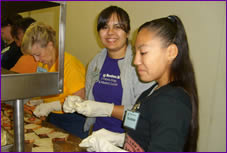
Do I get to choose what child I mentor?
Yes. We keep your preferences (such as age or religion) in mind when selecting options for you. We match for compatibility and interests of both youth and volunteer. You will be given a couple of choices for your match. Our goal is to have strong, long-lasting matches and we will match you to the best of our ability.
Can my spouse and I mentor together?
Yes. We call them Big Couples. This provides a role model of two parent families for many of our youth that live only with a single parent. It also can provide more flexibility for the mentor – if one of the couple has to be out of town for business occasionally, the other can meet alone with the Little.
What happens if my Little and I don’t seem to hit it off?
Sometimes a match just doesn’t seem to work and it needs to close. The Match Support Specialist helps you and the Little to go through a healthy closure process. Each can then be re-matched if they like.
However, sometimes in the first few months, it may seem like the youth is too quiet, or you are doing all the planning of the outings, and you’re not sure any relationship is building. Usually that is not the case at all – it just takes time to build trust. The Match Support Specialist can help you sort out these types of questions.
Can my own child join us on outings?
In general, we don’t encourage it. The program is focused on one-to-one time with the Little and building a strong relationship together. If sharing the time with your own child, the Little is not likely to get the full benefit of mentoring. Occasional outings that include members of your family are acceptable after the first several months of building a relationship. However, it should not be the common practice.
I’m not sure now is the right time for me to mentor. What else can I do to help?
There are all kinds of things, depending upon your experience and interests. We are looking for help with capital improvements, fundraising events, administrative assistance, helping with program activities for Bigs and Littles to do together as a group, activities to keep children on the waiting list involved, etc. If you don’t see anything here that fits for you, give us your idea of how you can help. We would love to hear from you.